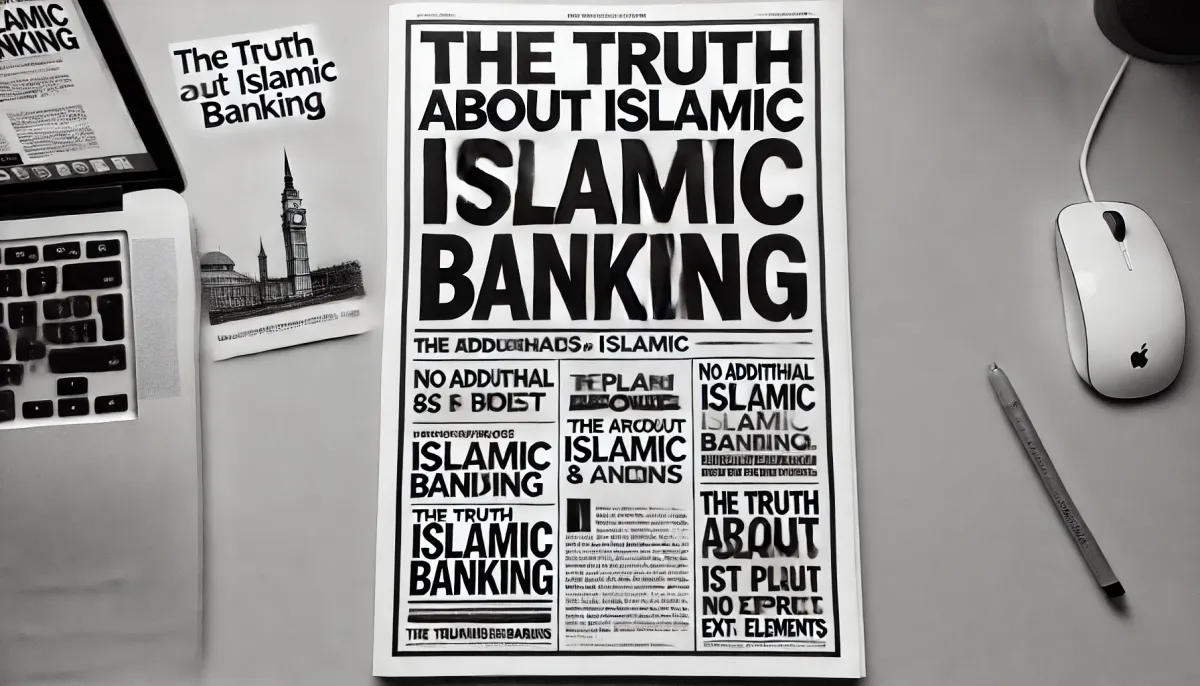In a revealing interview, Haris Irfan, a former global head of Islamic Finance at Barclays and co-founder of Deutsche Bank's Islamic Finance team, discusses the hidden realities behind the modern Islamic banking system. Having spent years at the forefront of Islamic Finance, Irfan exposes how Islamic banking, which is marketed as a morally superior alternative to conventional finance, may unfortunately be perpetuating a fraudulent system.
The Illusion of Ethical Banking
Irfan begins by explaining how Islamic banking mirrors conventional banking systems in almost every way, with only superficial changes. The key distinction Islamic banks claim is that they don’t charge interest (riba), but instead offer profit-sharing models. However, as Irfan highlights, this difference is more semantic than real. Islamic banks often "cross out the word ‘interest’ and replace it with ‘profit’," but the underlying mechanisms remain unchanged. The banks create money through credit creation, which is fundamentally at odds with Islamic principles.
In Islam, money creation through lending is not permissible, yet this is precisely what Islamic banks do under the guise of being Sharia-compliant. They structure contracts using Arabic terms such as murabaha (cost-plus financing) or mudarabah (profit-sharing), which makes them seem Islamic, but in reality, they are simply replicating the same structures of conventional banks while charging similar, if not higher, rates.
How Money Creation Violates Islamic Law
A significant portion of the conversation centers around the concept of money creation. In both conventional and Islamic banking, banks lend out more money than they hold in deposits—this is called fractional reserve banking. Irfan emphasizes that this process creates money "out of thin air," which is deeply problematic from an Islamic perspective. In Islam, money must be backed by real assets or trade, not created through debt.
Islamic banks, regulated similarly to conventional banks, engage in credit creation despite the fact that Islam prohibits creating money from nothing. This fraudulent aspect is covered up by the use of Islamic terminology, making the system seem compliant with Sharia law when, in fact, it contradicts core Islamic principles.
The Flawed Foundation of Islamic Finance
Irfan, who entered Islamic finance with idealistic intentions, admits that the system is fundamentally flawed. Islamic finance began with the hope of creating a more ethical, risk-sharing financial model based on real economic activity. However, as it evolved, Islamic banks became more focused on profit maximization than ethical compliance. The financial products they offer, such as sukuk (Islamic bonds), are often structured in a way that makes them indistinguishable from conventional interest-bearing bonds.
He explains that Islamic finance should operate outside of conventional financial systems. Attempting to reform conventional banking from within, as Islamic banks have tried to do, is doomed to fail because the system itself is inherently unethical. Islamic finance needs to develop as a parallel system based on real trade and investment, where both profit and risk are shared equitably between parties. The current model, however, still largely mimics the conventional system, with only a superficial Islamic veneer.
The Broader Impact of Financialization
Irfan links the issue of Islamic banking with the larger problem of financialization in the global economy. Financialization, the process where economic value is increasingly derived from financial markets rather than real economic activity, is a form of exploitation. It allows banks to extract wealth through lending and interest without contributing to actual production. In his view, this system, driven by fiat currency and debt, has led to massive inequality, inflation, and economic instability.
The 2008 financial crisis is a case in point. According to Irfan, such crises would not occur under a true Islamic economic model, which is based on real assets and trade rather than speculative financial products. He argues that Islamic finance, in its current form, does not provide a genuine alternative to this broken system, as it has been co-opted by conventional financial practices.
Islamic Banking: A Missed Opportunity
Islamic banking was initially seen as a way to offer Muslims an ethical alternative to conventional banks. However, as Irfan candidly admits, the system has failed to live up to its ideals. Instead of fostering a just and equitable financial model, Islamic banking has simply repackaged conventional financial products and sold them as Sharia-compliant. For Muslims seeking a genuinely ethical way to manage their finances, this is a profound betrayal.
Irfan concludes by calling for a return to the fundamentals of Islamic economics—real trade, profit-sharing, and risk-sharing. He suggests that Islamic finance can only succeed if it breaks away from the conventional banking model and operates in a completely separate, ethically grounded framework.
Final Thoughts
Islamic banking, as it exists today, is a far cry from the ethical, profit-sharing system it claims to be. Irfan’s insider perspective reveals that it operates on the same principles as conventional banks, violating core Islamic tenets. For Islamic finance to truly be a force for good, it must reject the conventional model and build a new financial system based on real economic activity, transparency, and risk-sharing.


